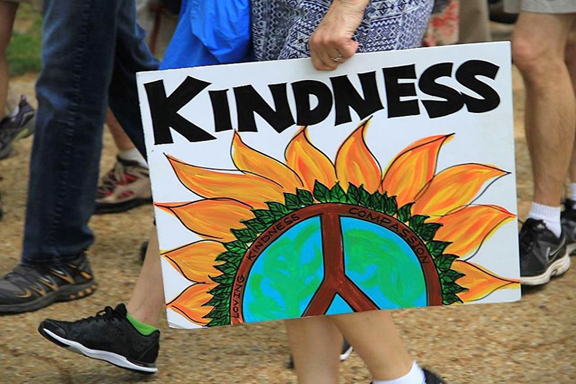written by Carole Reardon
Do please, always dance like no one is watching but, do you ever wonder during your day-to-day, who’s watching? Specifically, who sees you and who does the seeing reveal?
Do you feel anonymous in your car? Do your bumper stickers accurately represent who you are? Does the anonymity of social media give you cover to say things you would never say to someone’s face?
While teaching Middle School Sunday school, I was taken with an advertising campaign. In a series of inter-connected ads, multiple vignettes each featured a bystander observing a good deed, then later doing a good deed themselves: snatching a child out of the street and harm’s way, reaching for the item on the top shelf for a shorter colleague, stepping up to help a stranger struggling with a heavy package. In some fashion, each bystander spontaneously extended a random act of kindness, inspired by what he or she previously witnessed.
At my request, the insurance company sent me a DVD of the campaign. After we watched the entire cycle, I asked my class, “Where does it all begin? Who started it?” We thought and thought, realizing we couldn’t tell who started the chain of good deed events, it was sort of an endless circle with no clear beginning or end. “Because we never know who’s watching…” I think it was Tyler, one of those kids who always seemed to say the profound thing. (I learned an amazing amount about faith teaching Middle School Sunday school.)
The Church is the People, and the People are the Church. This is perhaps not news to you, but coming late to a religious education, it was a revelation to me and I say it often enough to roll the eyes of all who know me well. But taken together, today’s readings struck me afresh with the importance of how we represent ourselves, individually and collectively, as followers of Christ.
Jeremiah particularly had me envisioning God looking and sounding a whole lot like my mother, finger in my face, yelling, “If you think I’m gonna sit back idly while you run around talking trash in My name, well Young Lady, you have another think coming!” It is you who have scattered my flock, and have driven them away, and you have not attended to them. So I will attend to you for your evil doings, says the LORD in Jeremiah 23. Writing to the Colossians, Paul warns against becoming captive through philosophy and empty deceit, according to human tradition.
It can be easy for lay people like me (well, me, anyway) to apply Jeremiah solely to priests, pastors, and church leadership, yet any one of us can be a false prophet, may unwittingly scatter (or gather) God’s sheep. Every time I wear a cross, the symbol of Christ’s death and resurrection dangling below my chin, seen by everyone with whom I interact, I am representing Jesus and a faith tradition, and also how a stranger might be welcomed (or not) at the parish I attend.
Many years ago, there was a somewhat facile craze: plastic bracelets stamped WWJD, for What Would Jesus Do? Christians of every stripe bought and wore them, a talisman against bad behavior. At the time, my own scanty religious education allowed me only the rather limited thought, well, Jesus would be Nice, however Nice manifested situationally. I still had the image of Jesus as sweet lamb-to-the-slaughter, I hadn’t yet met table-flipping Jesus, hadn’t gone deep enough into my faith to understand the personal cost of following Jesus. In its simplest form, not being a jerk; praying sincerely for those who’ve sinned against me is a more adult, enlightened practice of my faith. I hadn’t yet experienced the freedom of subjugating my will to God’s, through Jesus. I hadn’t realized I am the Church, in granular form.
The unintended, but most important reason for the Episcopal bumper sticker on my car is it makes me mind my driving manners. What Would Jesus Do, for example, about the terrible drivers of the North Dallas Tollway? Would the Son of God extend a raised middle finger from the driver’s window, or would he instead say, Forgive them Father, for they know not the use of turn signals? I rather think the latter, so my hands stay on the wheel and, if not exactly asking God to forgive them, I swear quietly to myself so my fellow travelers cannot blame the Episcopal Church entire for my bad manners. The Church is the People, the People are the Church.
In Accidental Saints, Lutheran pastor Nadia Bolz-Weber writes movingly of a Good Friday vigil her parish brought to a house where violence and death had occurred. The following week, she was surprised by a call letting her know how much comfort the residents had taken in the vigil, how it helped them. At the time of the vigil, she had no idea anyone was watching.
Father of All, keep me mindful of your teachings, that I may be a worthy representation of the Church and The Way, through your Son and Savior, Jesus Christ our Lord.

